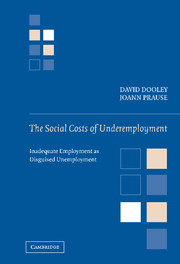Book contents
- Frontmatter
- Contents
- Preface
- 1 Disguised Unemployment and Changing Forms of Work
- 2 The Social Costs of Unemployment
- 3 Data Sources and Methods
- 4 Reverse Causation: Findings on the Selection Hypothesis
- 5 Leaving School: Self-esteem in an Unwelcoming Economy
- 6 Early Adulthood: Alcohol Misuse and Underemployment
- 7 Settling Down: Psychological Depression and Underemployment
- 8 Extending the Employment Continuum: Well-Being in Welfare Transitions
- 9 The Next Generation: Underemployment and Birthweight
- 10 Conclusions
- 11 New Directions
- Appendix A
- Appendix B
- References
- Name Index
- Subject Index
9 - The Next Generation: Underemployment and Birthweight
Published online by Cambridge University Press: 27 July 2009
- Frontmatter
- Contents
- Preface
- 1 Disguised Unemployment and Changing Forms of Work
- 2 The Social Costs of Unemployment
- 3 Data Sources and Methods
- 4 Reverse Causation: Findings on the Selection Hypothesis
- 5 Leaving School: Self-esteem in an Unwelcoming Economy
- 6 Early Adulthood: Alcohol Misuse and Underemployment
- 7 Settling Down: Psychological Depression and Underemployment
- 8 Extending the Employment Continuum: Well-Being in Welfare Transitions
- 9 The Next Generation: Underemployment and Birthweight
- 10 Conclusions
- 11 New Directions
- Appendix A
- Appendix B
- References
- Name Index
- Subject Index
Summary
A major task for research on the social costs of economic stress is to trace how macrosocial changes affect increasingly smaller social units and ultimately those microsocial phenomena that directly influence children in their families.
Elder & Caspi, 1988, p. 25INTRODUCTION
Intergenerational Effects
Do parents' adverse employment events affect their children? That parents' financial and psychological well-being might influence their children seems intuitively likely. Parents' loss of income should lower the whole family's standard of living and thereby threaten future opportunities to obtain important goals. Emotional stress on the parents following employment setbacks could infect other family members sensitive to the psychosocial climate of the family. But do such effects, if they exist, reach socially significant levels, and what form do they take? This chapter represents not the end of our exploration of underemployment and well-being but rather the beginning of an extension of this research across generations. We will explore the effect on the birthweight of firstborn children of adverse employment change experienced by women in the year before giving birth.
Evidence for a cross-generational impact of underemployment comes from various sources. Studies going back to the Great Depression have followed the lives of children whose parents coped with massive macroeconomic change (Elder, 1974). More recently, aggregate-level time-series studies have linked unemployment rates with community variations in levels of child abuse (Steinberg et al., 1981) and foster care placements (Catalano et al., in press).
- Type
- Chapter
- Information
- The Social Costs of UnderemploymentInadequate Employment as Disguised Unemployment, pp. 183 - 200Publisher: Cambridge University PressPrint publication year: 2003



